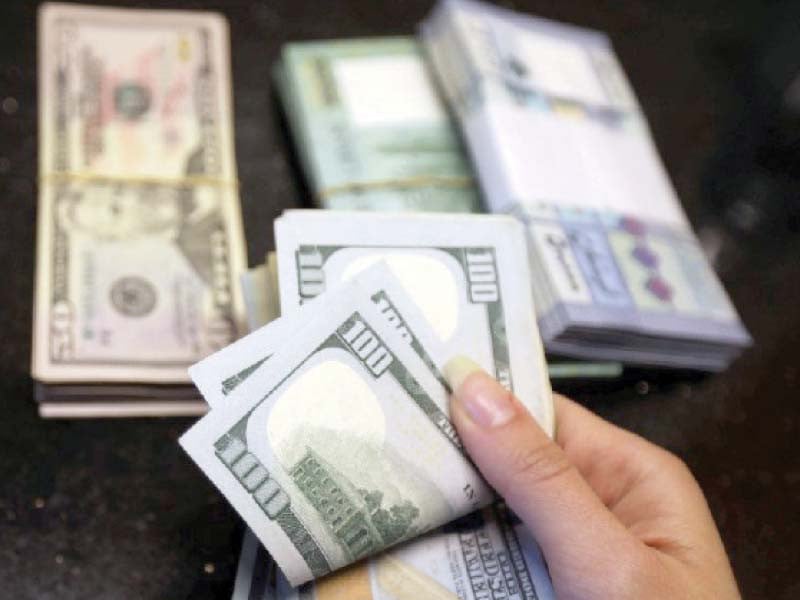
The inflows of foreign currency on account of workers' remittances sent home by overseas Pakistanis hit an eight-month low at $2.22 billion in October, as expatriates apparently switched to unauthorised channels to dispatch the funds in bid to fetch a better exchange rate.
The black market is offering an exchange rate of Rs235-240 for a dollar.
This is Rs14-18 higher compared with Rs221-222 being offered by official channels including commercial banks.
The State Bank of Pakistan (SBP) on Friday reported that the remittances decreased by 9.1% to $2.22 billion in October in comparison with $2.44 billion in the prior month of September.
This was 15.7% low in the month under review compared with $2.63 billion received in the same month of the last year.
Cumulatively in the first four-month (July-October) of the current fiscal -- 2023, the remittances dropped by 8.6% to $9.90 billion compared with $10.83 billion in the same period of the previous year.
With the exception of the US, the receipts of remittances from across the world have declined during the period of July-October 2022.
The workers' remittances from the US improved by 6.9% to $1.07 billion in the four months compared with the same period of the last year.
The inflows from the UK, however, dropped by 8.3% in the four months to $1.37 billion in the period under review.
The receipts from Saudi Arabia, the single largest region for Pakistan, reduced by 11.7% to $2.46 billion.
The inflows from the second largest region, the UAE, fell by 9.2% to $1.88 billion in the four months.
The inflows from other Gulf Cooperation Council countries decreased by 6.2% to $1.14 billion.
The workers' remittances from the EU countries declined by 11.1% to Rs1.06 billion.
Pakistan is witnessing a gradual slowdown in receipts of workers' remittances for the past several months.
Earlier, the inflows had continued to rise in the past two to 2.5 years since Covid-19 restrictions imposed at the outset of 2020 around the globe.
While talking to The Express Tribune, a leading bank's head of remittances department said the income of non-resident Pakistanis had dropped in recent months.
This is the situation even though thousands of more Pakistanis are going abroad every month to find a suitable job there.
However, the flow of workers' remittances through "official channels" including banks has dropped amid the “reorganisation of illegal hawala-hundi operators”.
Read Govt to further limit forex purchase
The Covid-19 lockdown and the then suspension of international travelling had broken the network of hawala-hundi operators around the world.
The lifting of the Covid-19 restrictions from the world has revived the black market of foreign currencies, he elaborated.
The banker said the return of volatility in rupee-dollar exchange rate in the inter-bank market and the offer of a better exchange rate in the black market have convinced non-resident Pakistanis to send remittances through hawala-hundi operators.
Secondly, he said, the value of the rupee was artificially kept high against the US dollar in the inter-bank and legal open markets. Finance Minister Ishaq Dar has continued to say the fair value of rupee lies in the range of Rs180-200 against thebUS dollar, while the country's foreign exchange reserves have continued to deplete despite the receipt of the International Monetary Fund’s (IMF) latest tranche of $1.2 billion and another $1.5 billion loan from the Asian Development Bank (ADB).
“The artificial overvalued rupee…and unsustainable foreign exchange reserves have also compelled overseas Pakistanis to switch to unauthorised channels to send remittances to their family members back home," the banker explained.
The workers' remittances might increase again if the government and law enforcement agencies crack down on hawala-hundi operators.
A large chunk of Pakistan's foreign exchange reserves is being utilised in Afghanistan and Iran.
“The government is just claiming it would come into action against illegal operators. But in reality, they are doing nothing to control the foreign exchange's illegal market in bordering areas and other parts of the country,” the banker maintained.
"The rupee-dollar exchange rate should be allowed to work on the demand and supply situation rather than on the wishes of the rulers," he said.
"The fair market-based exchange rate would automatically remove illegal channels and black markets,” he added.
Separately, the Pakistani currency fluctuated down by 0.10% (or Rs0.22) to close at Rs221.64 against the US dollar in the inter-bank market on Friday, ending the four-day long uptick streak.
The rupee has fallen against the greenback following the SBP’s report on Thursday that the country's reserves had dropped by almost $1 billion because of the repayment of a commercial loan last week.
It added that the reserves had presently fallen back to below $8 billion.
The existing reserves are standing at a critically low level, as they are barely enough to finance five weeks of imports.



1731637727-0/Bear--(1)1731637727-0-165x106.webp)

1731619853-0/ice-cream-(1)1731619853-0-165x106.webp)

1731647129-0/Untitled-design-(56)1731647129-0-270x192.webp)










COMMENTS
Comments are moderated and generally will be posted if they are on-topic and not abusive.
For more information, please see our Comments FAQ